LEIBNIZ (GOTTFRIED WILHELM)Autograph letter signed ("Leibniz") to Thomas Burnett ("Monsieur"), in French, pleased and surprised to hear that he is in a place of safety, presuming that his failure to thank the Electress and the Queen of Prussia for their help in obtaining his release from the Bastille must mean "...that you are unaware of your own history..." and explaining in detail how his freedom came about through various envoys and royal connections ("...I wrote about the matter too to the Bishop of Salisbury, who answered that he would try and persuade the Queen [Anne] to exchange you for someone... several attempts having completely failed... I asked M. d'Alefeld, the Danish Minister in Berlin to write about it to M. de Meiercron, Minister of his master the King at the Court of France to get him to talk to the Marquis de Torcy and the Queen also spoke to M. d'Alefeld in my presence... that envoy committed himself with zeal... the Electress wrote to the Queen [of France] on your behalf..."), giving reasons for his imprisonment ("...you were known to have evil designs, and were mixed up in suspicious activities, having come to France also without a passport... I said that one part of the report was slanderous and it looked as if the rest might well be too... your character was too well known in our courts for there to be any possible suggestions that you had malicious designs against the Government and the State..."), concluding by saying that his name was now clear ("...certain spies who haunted Paris taverns had thought they were doing themselves a good turn by denouncing you..."), going on to thank Burnett for information on scholars in Geneva and discussing various books such as John Ray's Wisdom of God and Cosmologia sacra by Nehemiah Grew ("...These are good books as they go into detail about nature and don't at all content themselves with generalities..."), noting he has reread Locke's book translated into French as he only had an old English edition ("...I see numerous things with which I totally disagree... I am pro innate ideas and anti tabula rasa..."), commenting on Locke's views of substance ("...he speaks cavalierly..."), liberty ("...good things... but does not explain it enough..."), identity and self consciousness ("...not at all correct..."), ending "...Finally there are endless things I would like to explain to myself quite differently from Mr. Lock. I often find his reflections a little too superficial and his philosophy a little too accommodated to the taste of some people...", admitting that there are many fine reflections in Locke's work and that the Essay is "...one of the finest philosophical books of our time...", with mentions of Rowland Guinn, troop movements and other matters, with many amendments and deletions, 4 pages on a bifolium, pencilled date at head [1704], dust-staining and other marks, creases, small tears and holes at folds, 4to (200 x 155mm.), [Hanover, 3 December 1703]Footnotes'UN DES PLUS BEAUX LIVRES PHILOSOPHIQUES DE CE TEMPS': LEIBNIZ ON LOCKE, & HIS FRIEND'S RELEASE FROM THE BASTILLE. In the latter part of this letter to his friend Thomas Burnett, Leibniz notes he is re-reading Locke in a new French translation and whilst he sometimes finds him "too superficial", he concludes here that it is "...one of the finest philosophical books of our time...". Much has been written on the relationship between Leibniz and Locke. For years, Burnett had acted as an intermediary between the two and has been described as having a significant influence on the way that the men viewed each other. Despite Leibniz's stellar reputation in European intellectual circles, Locke refused to reply directly to Leibniz's responses to his Essay Concerning Human Understanding, first published in 1689, and indeed professed to be rather intellectually disappointed in Leibniz. It has been argued that some of Leibniz's papers written between 1695 and 1700 in response to Locke were in fact a response to Burnett's
LEIBNIZ (GOTTFRIED WILHELM)Autograph letter signed ("Leibniz") to Thomas Burnett ("Monsieur"), in French, pleased and surprised to hear that he is in a place of safety, presuming that his failure to thank the Electress and the Queen of Prussia for their help in obtaining his release from the Bastille must mean "...that you are unaware of your own history..." and explaining in detail how his freedom came about through various envoys and royal connections ("...I wrote about the matter too to the Bishop of Salisbury, who answered that he would try and persuade the Queen [Anne] to exchange you for someone... several attempts having completely failed... I asked M. d'Alefeld, the Danish Minister in Berlin to write about it to M. de Meiercron, Minister of his master the King at the Court of France to get him to talk to the Marquis de Torcy and the Queen also spoke to M. d'Alefeld in my presence... that envoy committed himself with zeal... the Electress wrote to the Queen [of France] on your behalf..."), giving reasons for his imprisonment ("...you were known to have evil designs, and were mixed up in suspicious activities, having come to France also without a passport... I said that one part of the report was slanderous and it looked as if the rest might well be too... your character was too well known in our courts for there to be any possible suggestions that you had malicious designs against the Government and the State..."), concluding by saying that his name was now clear ("...certain spies who haunted Paris taverns had thought they were doing themselves a good turn by denouncing you..."), going on to thank Burnett for information on scholars in Geneva and discussing various books such as John Ray's Wisdom of God and Cosmologia sacra by Nehemiah Grew ("...These are good books as they go into detail about nature and don't at all content themselves with generalities..."), noting he has reread Locke's book translated into French as he only had an old English edition ("...I see numerous things with which I totally disagree... I am pro innate ideas and anti tabula rasa..."), commenting on Locke's views of substance ("...he speaks cavalierly..."), liberty ("...good things... but does not explain it enough..."), identity and self consciousness ("...not at all correct..."), ending "...Finally there are endless things I would like to explain to myself quite differently from Mr. Lock. I often find his reflections a little too superficial and his philosophy a little too accommodated to the taste of some people...", admitting that there are many fine reflections in Locke's work and that the Essay is "...one of the finest philosophical books of our time...", with mentions of Rowland Guinn, troop movements and other matters, with many amendments and deletions, 4 pages on a bifolium, pencilled date at head [1704], dust-staining and other marks, creases, small tears and holes at folds, 4to (200 x 155mm.), [Hanover, 3 December 1703]Footnotes'UN DES PLUS BEAUX LIVRES PHILOSOPHIQUES DE CE TEMPS': LEIBNIZ ON LOCKE, & HIS FRIEND'S RELEASE FROM THE BASTILLE. In the latter part of this letter to his friend Thomas Burnett, Leibniz notes he is re-reading Locke in a new French translation and whilst he sometimes finds him "too superficial", he concludes here that it is "...one of the finest philosophical books of our time...". Much has been written on the relationship between Leibniz and Locke. For years, Burnett had acted as an intermediary between the two and has been described as having a significant influence on the way that the men viewed each other. Despite Leibniz's stellar reputation in European intellectual circles, Locke refused to reply directly to Leibniz's responses to his Essay Concerning Human Understanding, first published in 1689, and indeed professed to be rather intellectually disappointed in Leibniz. It has been argued that some of Leibniz's papers written between 1695 and 1700 in response to Locke were in fact a response to Burnett's

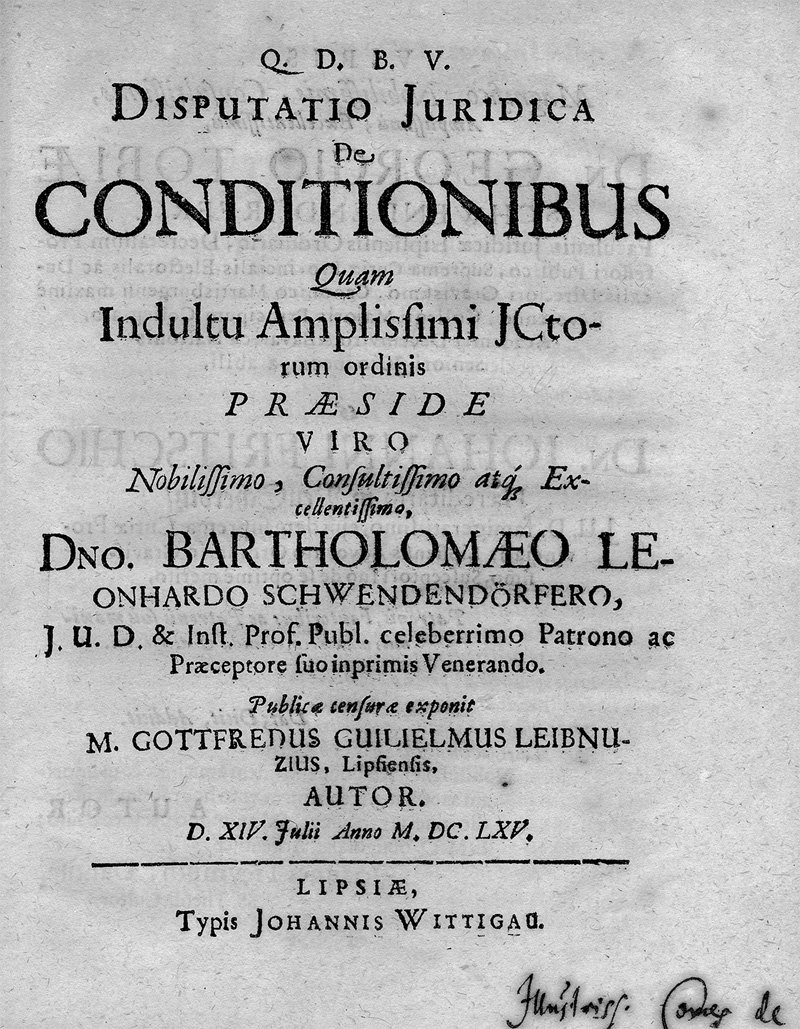
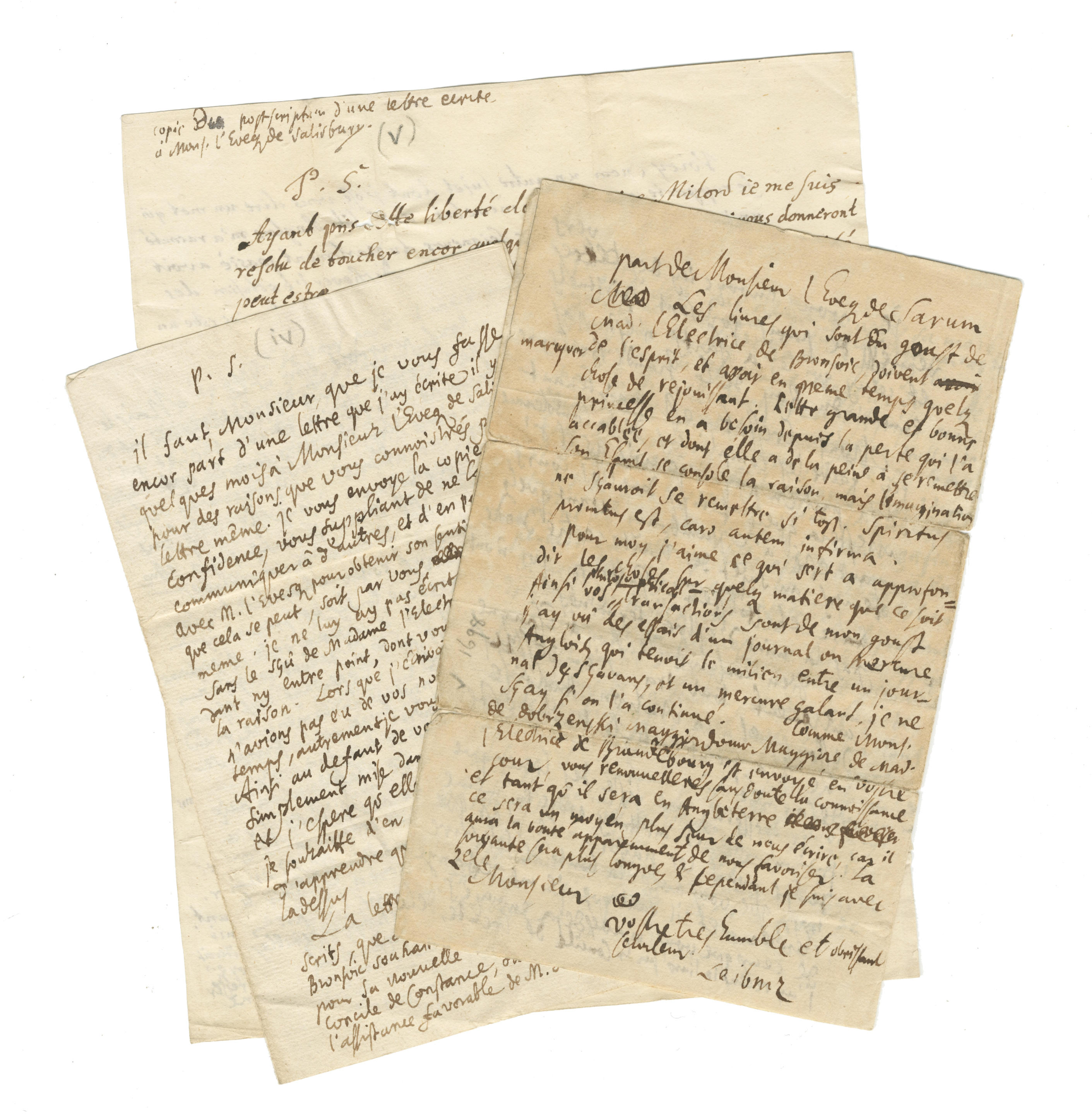
.jpg)
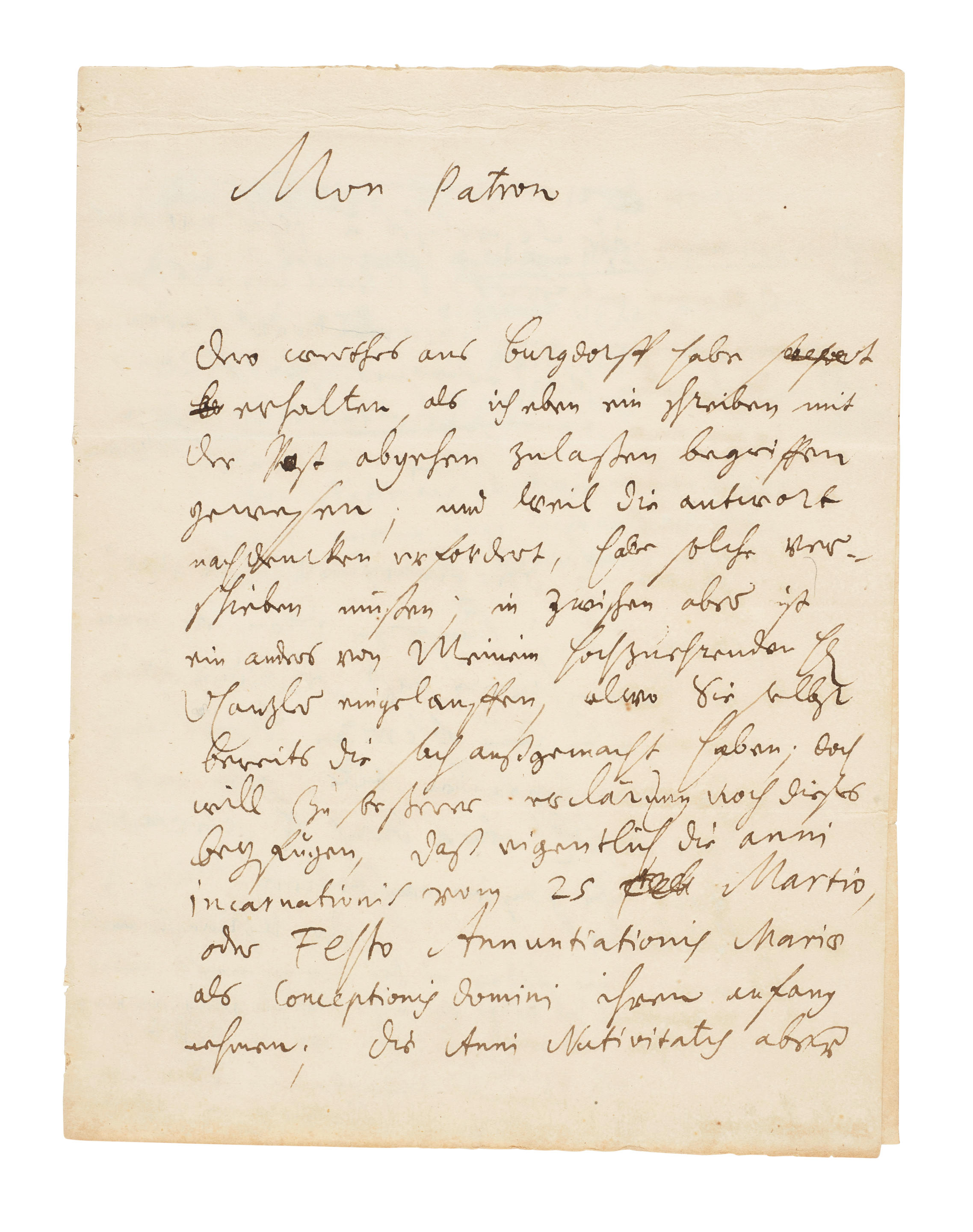

.jpg)
.jpg)
.jpg)




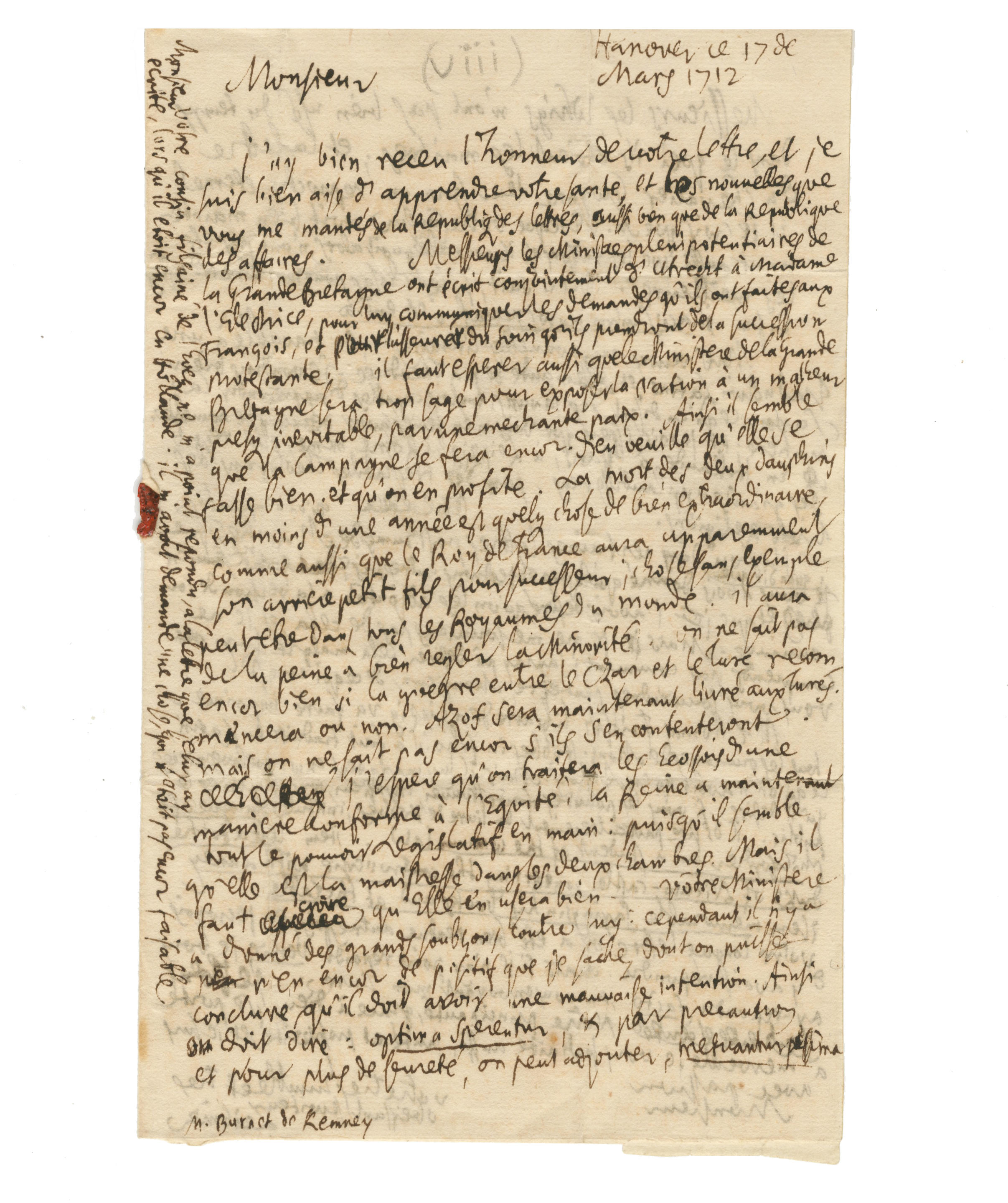
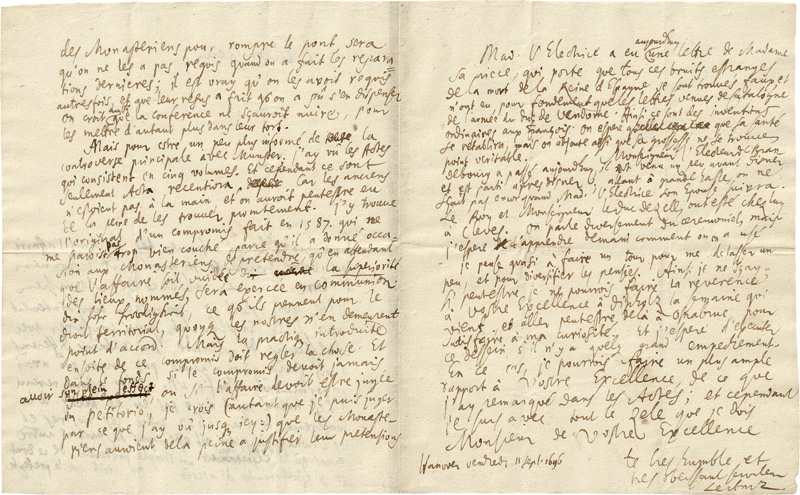
Try LotSearch and its premium features for 7 days - without any costs!
Be notified automatically about new items in upcoming auctions.
Create an alert